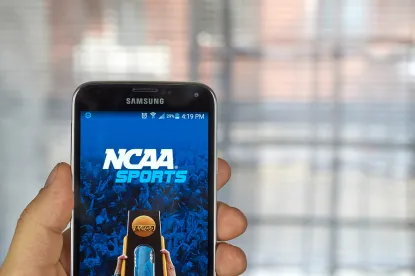An additional federal legislative proposal regarding college athlete name, image, and likeness (NIL) rights has been introduced on Capitol Hill. The Bill, known as the College Athlete Economic Freedom Act (“Freedom Act”), is authored by Senator Chris Murphy (D-Conn.) a leading advocate and author on college athlete rights and U.S. Representative Lori Trahan (D-Mass.), a former NCAA Division I athlete at Georgetown University. The proposed legislation will protect the name, image and likeness rights of current collegiate student-athletes and become the first proposed federal legislation to also provide rights to prospective collegiate student-athletes.
The Bill adds to the ever-growing number of federal NIL legislative proposals, joining the College Athlete Bill of Rights proposed by Senators Booker (D-NJ) and Blumenthal (D-Conn), the Collegiate Athlete and Compensation Rights Act introduced by Senator Wicker (R-Miss), the Fairness in Collegiate Athletics Act presented by Senator Rubio (R-Fla), and the bi-partisan Student Athlete Level Playing Field Act introduced by Representatives Gonzalez (R-Ohio) and Cleaver (D-Mo).These federal proposals have followed a wave of state-level NIL legislation, which has already resulted in six states passing NIL laws (California, Florida, Nebraska, Colorado, New Jersey and Michigan).
While not as expansive as the College Athlete Bill of Rights, the most recent federal proposal, the Freedom Act provides substantial rights to NCAA student-athletes, including the right to financially benefit from the commercial use of their name, image, and likeness and the right to use attorneys and agents to negotiate NIL opportunities. The Freedom Act also guarantees that these financial opportunities can be pursued and secured without affecting the student-athletes’ ability to continue their collegiate careers and scholarship eligibility.
Commenting on the proposed legislation, Representative Trahan stated, “As leaders at the NCAA finally come to grips with the need for change, it’s important that Congress enact reforms to establish and protect student-athletes’ right to be compensated for the use of their name, image, likeness, or athletic association.”
One of the distinct highlights of the Freedom Act authorizes student-athletes to secure opportunities as individuals or to work together to secure group licensing rights. This authorizes student-athletes to coordinate group efforts to negotiate for the use of their NIL rights to secure and share revenue from the lucrative video game and apparel marketplaces, without restrictions from the NCAA or its conferences or member institutions.
The Freedom Act is also free from anti-trust protections highly sought by the NCAA. Unlike Senator Wicker’s bill, which proposes broad anti-trust protections insulating the NCAA from liability, the Freedom Act provides penalties if the NCAA, a conference, or member institution denies an athlete the right to market his or her name, image, or likeness. Further, the Freedom Act grants a specific private right of action to impose penalties against violators who engage in unfair or deceptive practices in violation of the Act.
Commenting on his bill, Senator Murphy stated, “It’s simple: this is about restoring athletes’ ownership over the use of their own names and likeness. They own their brand, not their school or the NCAA.”
The Freedom Act also leaves the door open for student-athletes to engage in a form of collective negotiation. While not specifically declaring student-athletes as “employees” and authorizing their ability to formally unionize under the National Labor Relations Act, the Freedom Act authorizes student-athletes to join together and engage in collective action, which would not require student-athletes to hold “employee” or “union” status, but would allow a “collective representative” to represent student-athletes as a group.
Finally, the Freedom Act grants the NCAA at least one of the items on its list by preempting all state laws governing NIL. As such, the Bill would create a uniform, national framework for NIL usage and compensation rights.




 />i
/>i
